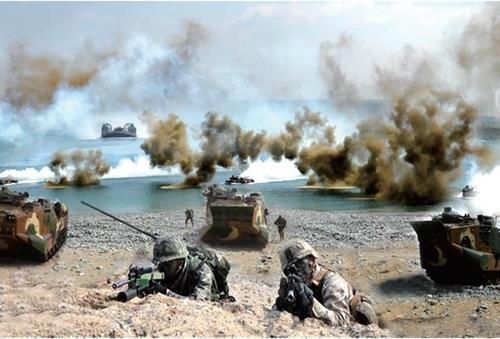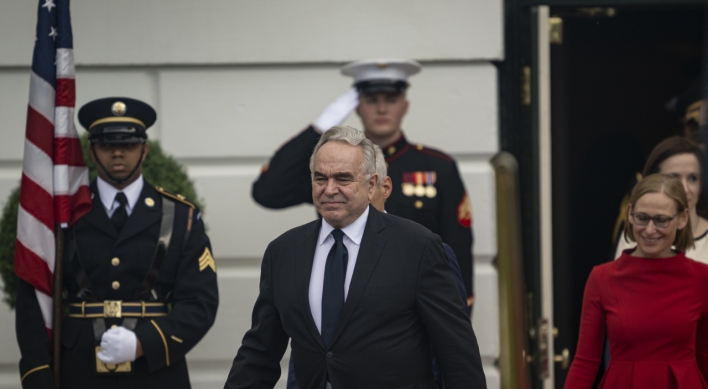S. Korea, US defense chiefs have yet to decide on joint drills
By Choi Si-youngPublished : July 21, 2020 - 15:40

Defense chiefs of South Korea and the US held a teleconference Monday to discuss a number of pending issues and reaffirmed that both sides will “unwaveringly” work together for the handover of wartime operational control from the US back to South Korea.
But no conclusion has been reached yet on whether or not to hold August’s annual joint drills as planned, the Ministry of National Defense in Seoul said Monday.
“Nothing has been decided. The two sides are still in close consultation on whether to press ahead or cut back the drills,” Defense Ministry deputy spokesperson Moon Hong-sik said, denying the two chiefs were reducing the drills or that that they have failed to reach a consensus.
The defense chiefs also reaffirmed the commitment to transferring wartime operational command, which Washington first exercised through the US-led UN Command at the onset of the 1950-53 Korean War, Moon said.
The biggest challenge to holding the drills in mid-August as usual is the unabating coronavirus pandemic, which has taken the greatest toll on the US, as it has reported the highest numbers of deaths and infections worldwide.
“Everything hinges on how many American troops – mostly reserve forces who have other jobs there – would fly here for the exercises,” a senior Defense Ministry official said, noting a broader objective is then set for the Korea-US combined forces to detail the drill plans accordingly.
The August drills carry exceptional weight this year because Seoul hoped to test stage two of a three-phase plan at the drills to take over wartime operational control from Washington.
But the two allies remain at odds over whether to test the handover program this year, with US commander Gen. Robert Abrams unequivocally highlighting the need to test joint defense readiness rather than the program.
The US was reportedly pressing hard on the regular drills, saying the two sides had already missed out on full-scale drills in March and that testing the handover scheme would involve inviting additional American military personnel here, posing another setback that could delay a final call on the joint exercises.
“Well the gap in opinion … we’ll have deal with it after we come to draft a broader mission for this year’s drills, which has yet to be set, because no decision has been made on a troop augmentation from the US,” the senior official said.
With the Defense Ministry offering no definite date for the drills, speculation has been mounting over postponing them to September, which would affect the Moon government’s pledge to complete the third and final stage of the handover scheme in 2021 to wrap up the transfer by 2022.
The Defense Ministry made it crystal clear that there has been no discussion whatever about cutting down or pulling out altogether the 28,500 American forces here to deter aggression from a nuclear-armed North Korea.
The Wall Street Journal, citing an unnamed US official, reported Friday that in March the US State Department had offered the White House the option to adjust the number of American troops here as part of a global repositioning of the US military worldwide.
The Trump administration has not publicly acknowledged the report, while a Pentagon official was quoted as saying in response: “We routinely review global force posture, and the president has been clear and consistent regarding cost sharing worldwide.”
“Nothing specific seemed to have been addressed on the ongoing defense cost-sharing talks,” the senior official said, adding the issue falls under the purview of the Foreign Ministry.
The two sides have been deadlocked for long over how to share the costs for the upkeep of 28,500 American troops here, with some analysts saying Washington was aiming to leverage the pullout rumors to press Seoul to shoulder a greater share of contributions this year.
By Choi Si-young (siyoungchoi@heraldcorp.com)
But no conclusion has been reached yet on whether or not to hold August’s annual joint drills as planned, the Ministry of National Defense in Seoul said Monday.
“Nothing has been decided. The two sides are still in close consultation on whether to press ahead or cut back the drills,” Defense Ministry deputy spokesperson Moon Hong-sik said, denying the two chiefs were reducing the drills or that that they have failed to reach a consensus.
The defense chiefs also reaffirmed the commitment to transferring wartime operational command, which Washington first exercised through the US-led UN Command at the onset of the 1950-53 Korean War, Moon said.
The biggest challenge to holding the drills in mid-August as usual is the unabating coronavirus pandemic, which has taken the greatest toll on the US, as it has reported the highest numbers of deaths and infections worldwide.
“Everything hinges on how many American troops – mostly reserve forces who have other jobs there – would fly here for the exercises,” a senior Defense Ministry official said, noting a broader objective is then set for the Korea-US combined forces to detail the drill plans accordingly.
The August drills carry exceptional weight this year because Seoul hoped to test stage two of a three-phase plan at the drills to take over wartime operational control from Washington.
But the two allies remain at odds over whether to test the handover program this year, with US commander Gen. Robert Abrams unequivocally highlighting the need to test joint defense readiness rather than the program.
The US was reportedly pressing hard on the regular drills, saying the two sides had already missed out on full-scale drills in March and that testing the handover scheme would involve inviting additional American military personnel here, posing another setback that could delay a final call on the joint exercises.
“Well the gap in opinion … we’ll have deal with it after we come to draft a broader mission for this year’s drills, which has yet to be set, because no decision has been made on a troop augmentation from the US,” the senior official said.
With the Defense Ministry offering no definite date for the drills, speculation has been mounting over postponing them to September, which would affect the Moon government’s pledge to complete the third and final stage of the handover scheme in 2021 to wrap up the transfer by 2022.
The Defense Ministry made it crystal clear that there has been no discussion whatever about cutting down or pulling out altogether the 28,500 American forces here to deter aggression from a nuclear-armed North Korea.
The Wall Street Journal, citing an unnamed US official, reported Friday that in March the US State Department had offered the White House the option to adjust the number of American troops here as part of a global repositioning of the US military worldwide.
The Trump administration has not publicly acknowledged the report, while a Pentagon official was quoted as saying in response: “We routinely review global force posture, and the president has been clear and consistent regarding cost sharing worldwide.”
“Nothing specific seemed to have been addressed on the ongoing defense cost-sharing talks,” the senior official said, adding the issue falls under the purview of the Foreign Ministry.
The two sides have been deadlocked for long over how to share the costs for the upkeep of 28,500 American troops here, with some analysts saying Washington was aiming to leverage the pullout rumors to press Seoul to shoulder a greater share of contributions this year.
By Choi Si-young (siyoungchoi@heraldcorp.com)


![[Exclusive] Korean military set to ban iPhones over 'security' concerns](http://res.heraldm.com/phpwas/restmb_idxmake.php?idx=644&simg=/content/image/2024/04/23/20240423050599_0.jpg&u=20240423183955)




![[Pressure points] Leggings in public: Fashion statement or social faux pas?](http://res.heraldm.com/phpwas/restmb_idxmake.php?idx=644&simg=/content/image/2024/04/23/20240423050669_0.jpg&u=)

![[Herald Interview] 'Amid aging population, Korea to invite more young professionals from overseas'](http://res.heraldm.com/phpwas/restmb_idxmake.php?idx=644&simg=/content/image/2024/04/24/20240424050844_0.jpg&u=20240424200058)









